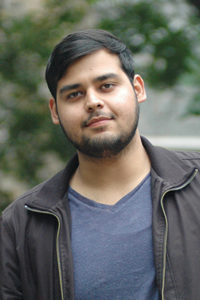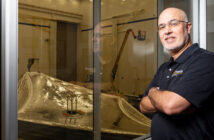
Saad Mansoor
The media portrayal of Muslims in the West usually consists of broad generalizations that are inaccurate and primarily focused on violence. The way Muslims are portrayed creates stereotypes that continuously perpetuate fear within communities.
The term given to that fear is Islamophobia.
I am one of over 1.6 billion Muslims in the world, and the idea that all of us are violent creatures is preposterous. Just take a look at some of the words our president has used to describe Muslims.
“I think Islam hates us. There’s something there that — there’s a tremendous hatred there. There’s a tremendous hatred. We have to get to the bottom of it. There’s an unbelievable hatred of us,” said President Donald Trump in an interview with CNN in 2015.
On another occasion while speaking to a rally, Trump said that on Sept. 11 he, “watched when the World Trade Center came tumbling down. And I watched in Jersey City, [New Jersey], where thousands and thousands of people were cheering as that building was coming down.”
Trump has a long history of anti-Muslim bigotry. As president, his words matter and they have consequences. Just recently, 50 people were shot in a terrorist attack at two mosques in New Zealand. The mastermind behind the attack was a 28-year-old white supremacist who, in his manifesto, described Trump “as a symbol of renewed white identity and common purpose.”
A study conducted by academics at Cardiff University found that the majority of news coverage regarding Muslims post-9/11 has been negative. The negative coverage has created a generalized perception for all Muslims. Sadly, events like the New Zealand shootings are not enough to unite the people from different faiths anymore. In fact, hate crimes against Muslims increased significantly after the deadly attack. A significant number of people truly believe that those Muslims deserved to die.
Tell Mama, an NGO that documents Islamophobic incidents in the UK, reported Sunday that anti-Muslim hate crimes have increased by 593 percent in the week after the Christchurch shootings. People have been verbally abused, intimidated, and more than five mosques have been attacked.
People in China also shared the same sentiment about Muslims after the attack. Weibo, which is China’s alternative to Twitter, was filled with comments that expressed anti-Muslim rhetoric. The top comment on a video of the incident shared by People’s Daily, China’s largest news outlet, described Muslims as “cancer cells.”
My aunt lives in Dallas, and she wears a headscarf. She was recently stopped at the mall and was made fun of by two individuals for the way she looks. Sadly, this has now become the new normal.
They repeatedly told her, “Go back to where you belong.”
After reading the shooter’s manifesto, I must say nothing surprised me. His declaration described Muslims as immigrants and the “most despised group of invaders in the West.” The act itself was “revenge” against Islam. I couldn’t help but notice that a lot of his rhetoric had been taken from the current political and media landscape against Muslims, especially in America.
The media in America openly condemns Muslims and uses words such as radical and fanatical to describe them. This negativity is framed in a way that shows all Muslims as dangerous and violent people so all Americans should stay away from them. What that does is create an us-versus-them mentality, which essentially inhibits any positive relations within a community. A 2017 poll found that half of United States adults believe that Islam does not have a place in “mainstream American society.”
As the news cycle developed after the attack and more details started coming out, there was one part of the story that all media outlets failed to talk about. That was: how accepted the notion of Islamophobia has become and why a significant majority of people across the world feel that the Muslims who died in the attack deserved it.
There needs to be an improvement in media practices and how they portray Muslims to their audience. They have to be more objective, responsible and honest in their approach. The attack in New Zealand was an attack on religious freedom no matter what religion the victims belonged to. That is what the world needs to remember.
We, as a society, need to start taking more responsibility in order to drive away all the hate and bigotry that exists in our divided world.
Saad Mansoor, ’19, is an assistant new reporter for the Brown and White. He can be reached at [email protected].





Comment policy
Comments posted to The Brown and White website are reviewed by a moderator before being approved. Incendiary speech or harassing language, including comments targeted at individuals, may be deemed unacceptable and not published. Spam and other soliciting will also be declined.
The Brown and White also reserves the right to not publish entirely anonymous comments.
2 Comments
Hey Saad, how many Presbyterians, Methodists, Catholicss have cut off Mosolim head in the last five years. I think there is something to be worried about. And how about stonings and genital mutilation.
I consider white supremacists misguided people who lack self confidence whose activities promote evil. Considered as being Caucasian I feel competent and obliged to disparage such people who lack respect for those who are “not like them”. To disparage those to whom you lack of an attachment seems to be less productive. Everyone is welcome to their opinion but I would like to see more of a relationship to those being evaluated. The point being I would like to see Muslims evaluate the actions of those claiming to be Muslims and acting discriminatory or as terrorists; then continue with a comparison of non-muslims acting the same.
I don’t see the New Zealand attack as about anti religious freedom. The shooter described himself as a racist and fascist (fascist: a political philosophy, movement, or regime (such as that of the Fascisti) that exalts nation and often race above the individual and that stands for a centralized autocratic government headed by a dictatorial leader, severe economic and social regimentation, and forcible suppression of opposition). By that definition I would say ISIS qualifies. ISIS claims to be Muslim. https://en.m.wikipedia.org/wiki/Islamic_State_of_Iraq_and_the_Levant
To describe President Trump “as a symbol of renewed white identity and common purpose.” is an error in judgement. To me he is a symbol of egotism, his belief is in himself rather than any particular ideology. His name tends to be high-jacked by those who want to bask in his high profile position as a world leader. Anybody who glorifies him feeds his ego not withstanding any connection of their ideas/goals to his.
“We, as a society, need to start taking more responsibility in order to drive away all the hate and bigotry that exists in our divided world.” I would state that as promoting our common humanity despite our differences. https://www.americamagazine.org/faith/2019/02/03/why-pope-francis-traveling-heartland-muslim-world